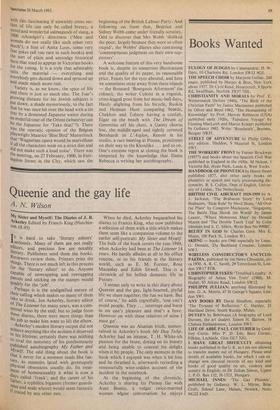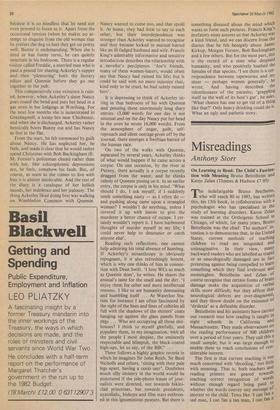Queenie and the gay life
A. N. Wilson
It is hard to take 'literary editors' seriously. Many of them are not really editors, and precious few are notably literary. Publishers send them the books. Reviewers review them. Printers print the things. s There is not much left in this process for the 'literary editor' to do. Anyone capable of unwrapping and rewrapping Parcels and sticking on the stamps would Qualify for the 'job'. Perhaps it is the undignified nature of their calling which makes so many of them take to drink. Joe Ackerley, literary editor of The Listener for many years, was a com- mitted wino by the end; but to judge from these diaries, there were more things than 1115 job to make him want to lift the elbow.
Ackerley's modest literary output did not achieve anything like the acclaim it deserved in his lifetime; certainly there was nothing to rival the notoriety of his posthumously Published autobiography My Father and AlYself The odd thing about the book is that it never for a moment reads like fan- tasy, as memoirs laced with grotesquely Physical obsessions usually do. Its treat- Tent of homosexuality is what is now a claYs called 'frank'; and the career of his father, a syphilitic bigamist (former guards- Man and male whore) would seem fantastic If traced by any other pen. When he died, Ackerley bequeathed his diaries to Francis King, who now publishes a selection of them with a title which makes them seem like a companion volume to the earlier self-portrait: My Sister and Myself. The bulk of the book covers the year 1949, when Ackerley had been at The Listener 14 years. He hardly alludes at all to his office routine, or to his friends in the literary world, such as E. M. Forster, Rose Macaulay and Edith Sitwell. This is a chronicle of his hellish domestic life in Putney.
'I meant only to write in this diary about Queenie and the gay, light-hearted, joyful life we share together; the fun we have. But of course,' he adds regretfully, 'one can't avoid people, They ... interrupt and burst in on one's pleasure and that's a bore. However on with these relatives of mine I must go'.
Queenie was an Alsatian bitch, immor- talised in Ackerley's book My Dog Tulip. Ackerley had an intense, T. H. White-ish passion for the brute, doting on its beauty and being unable to conceal his delight when it bit people. The only moment in the book which I enjoyed was when it bit him and he thrashed it, afterwards recording a remorsefully wine-sodden account of the incident in the notebook.
At the beginning of the chronicle, Ackerley is sharing his Putney flat with Aunt Bunny, a vulgar twice-married woman whose conversation he enjoys because it is so mindless that he need not even pretend to listen to it. Apart from the occasional tension (when he makes no at- tempt to disguise from the old woman that he prefers the dog to her) they get on pretty well. Bunny is undemanding. When she is tired or has funny turns, he can quietly entertain in his bedroom. There is a regular -visitor called Freddie, a married man who is paid a pound for sharing Ackerley's supper and then 'pleasuring' both the literary editor and Queenie before they go out together to the pub.
This comparatively rosy existence is ruin- ed, however, when Ackerley's sister Nancy goes round the bend and puts her head in a gas oven in her lodgings at Worthing. For the next few months she is incarcerated in Graylingwell, a loony bin near Chichester, and when she is discharged, Ackerley rather heroically boots Bunny out and has Nancy to live in the flat.
From the start, he felt tormented by guilt about Nancy. He has neglected her, he feels, and made it clear that he would rather spend Christmas with Bob Buckingham (E. M. Forster's policeman chum) rather than with her. Her schizophrenic depressions are, he feels, somehow his fault. But, of course, as soon as she comes to live with him it is almost intolerable. And the rest of the diary is a catalogue of her hellish moods, her indolence and her jealousy. The thing Ackerley liked doing best was walking on Wimbledon Common with Queenie. Nancy wanted to come too, and that spoilt it. At home, they had little to say to each other, but their interdependence was stronger than Ackerley wanted to recognise and they became locked in mutual hatred like an ill-fadged husband and wife. Francis King's admirably informative and sensitive introduction describes the relationship with a novelist's percipience. `Joe's friends, many of them women-haters, would often say that Nancy had ruined his life; but it could be said with no more injustice that, kind only to be cruel, he had subtly ruined hers'.
It is depressing to think of Ackerley sit- ting in that bedroom of his with Queenie and penning these enormously long diary entries. (3,000 words for one day is not unusual and on the day Nancy put her head in the oven he wrote 16,000 words). From the atmosphere of anger, guilt, self- reproach and silent outrage given off by the journal, there emerges a Swiftian hatred of the human race.
On two of the walks with Queenie, separated by several years, Ackerley thinks of what would happen if he came across a corpse. On one occasion, by the river at Putney, there actually is a corpse recently dragged from the water, and he thinks calmly of Queenie pissing on it. In an earlier entry, the corpse is only in his mind. 'What should I do, I ask myself, if I suddenly smelt something nasty — as I often do and pushing along came upon a strangled woman? I wouldn't do anything, unless I covered it up with leaves to give the murderer a better chance of escape. I cer- tainly wouldn't report it. I have harboured thoughts of murder myself in my life; I could never help to denounce or catch anyone else'.
Reading such reflections, one cannot help admiring his total absence of humbug. If Ackerley's misanthropy is obviously repugnant, it is also refreshingly honest, which is why one thinks of him in connec- tion with Dean Swift. '1 love WCs as much as Queenie does', he writes. He shares the animal's taste for the smell and the dirt. 'I enjoy them for other and more intellectual reasons. I like to see humanity demeaning and humbling itself ... At Waterloo Sta- tion for instance I am often fascinated by the sight of the lines and lines of cubicles all full with the shadows of the shiners' coats hanging up against the glass panels from pegs ... Who are occupying all those shit- houses? I think to myself gleefully, and populate them, in my imagination, with all the people I most despise, the eminently respectable and blimpish, the black-coated high-ups, let us say, of the BBC' ...
There follows a highly graphic reverie in which he imagines Sir John Reith, Sir Basil Nicholls and others, 'sitting with their pale legs apart, having a GOOD SHIT'. Doubtless much silly idolatry in the world would be punctured if the tele-photo lenses of jour- nalists were directed, not towards bikini- clad princesses, but towards presidents, ayatollahs, bishops and film stars enthron- ed in this ignominious posture. But there is
something diseased about the mind which wants to form such pictures. Francis King's prefatory essay assures us that Ackerley was a kind friend, and we can discern from the diaries that he felt benignly about James Kirkup, Morgan Forster, Bob Buckingham and a few others. But for the most part, this is the record of a man who despised humanity, and who positively loathed the females of that species. 'I see there is a cor- respondence between tapeworms and mY sister — perhaps women generally', he wrote. And having described the relentlessness of the parasite, 'grappling itself to the wall of its host's gut', he asks, 'What chance has one to get rid of a thing like that?' Only heavy drinking could do it. What an ugly and pathetic story..



































 Previous page
Previous page